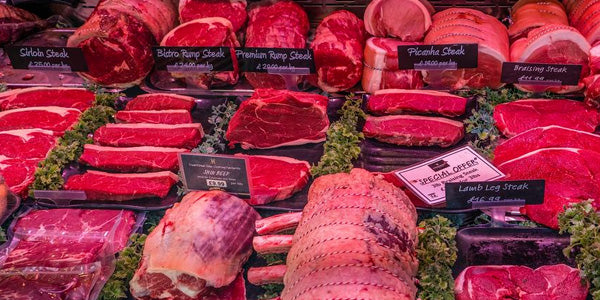For the unfortunate ones among us who suffer from gout, it can be difficult to know exactly what will trigger a painful flare-up. Whether it’s due to putting too much strain on the affected joints, the weather, or something in our diet, gout flare-ups are something that most will do almost anything to avoid. So, what foods should we be avoiding? And more specifically, are red meats bad for gout?
Gout has often been referred to as the “Disease of Kings”, referencing the long-held belief that the incurable arthritic condition is caused by a rich diet of meat and alcohol. But while diet can certainly play a key role in gout, it’s not quite as simple as this common myth would have us believe. But how exactly does diet affect gout?
The result of a rich diet?
Gout is caused by a build-up of uric acid in the blood which, over time, forms sharp crystals in the joints. While these crystals most commonly form in the joints of the feet - particularly the big toes - they can also occur in other areas of the body, including the knees, elbows, and even shoulders.
It is widely accepted that purines, an extremely common natural compound, found both in our bodies and in most living things on the planet, play a key role in these heightened uric acid levels. When broken down in the body, purines become uric acid. While this waste product is usually filtered out of the body via the kidneys, this doesn’t always occur effectively. This might be due to kidney problems, dehydration, or simply consuming too many purines in the diet.
Is red meat bad for gout?
As mentioned above, most living things in the world - including fruits and vegetables - contain some level of purines. However, some products are significantly higher in these compounds than others. So, what about meat?
Well, this is where the “Disease of Kings” story starts to make sense. It turns out that many meats contain high concentrations of purines - with some considered more risky than others for those of us living with gout. Unfortunately, many red meats are included on this list.
Generally, healthcare practitioners will recommend a gout-friendly diet to help reduce the risk of experiencing a flare-up. And one of the first things they will recommend you avoid is red meat. This includes:
- Beef
- Lamb
- Pork
- Organ meats, such as liver, kidney, heart, etc…
Other health effects of red meat
Red meat is a great source of a number of nutrients, including iron, zinc, and B vitamins. In fact, meat in general is one of the main sources of vitamin B12. However, even for those without gout, it is recommended that we limit the amount of red meat in our diet.
There is some evidence that eating too much red meat may be linked to bowel cancer. Furthermore, while liver meat is a good source of iron and vitamin A, it is recommended that it should be consumed sparingly. That’s because having too much vitamin A (more than 1.5mg daily) over many years can make your bones more likely to fracture as you get older.
Conclusion
So, is it necessary to avoid red meats altogether if you have gout? Well, that is a personal decision that only you can make. However, if you do decide to enjoy a steak or lamb cutlet every now and then, you should limit your serving size and make sure it’s just an occasional treat - your joints will likely thank you later.
If you do decide to indulge in high-purine foods like red meat, then it is a good idea to utilise other gout management techniques. For example, staying hydrated and taking regular supplements can help to stave off gout attacks. Nonetheless, it’s probably best to save the steak for special occasions.






